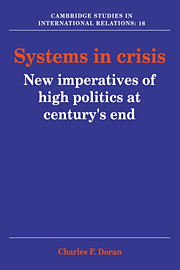Book contents
- Frontmatter
- Contents
- Preface
- Acknowledgments
- Introduction: new perspectives on the causes and management of systems crisis
- Part 1 Dynamics of state power and role: systems structure
- Part 2 Dynamics of major war and systems transformation
- Part 3 Dynamics of general equilibrium and world order
- Part 4 Systems transformation and world order at century's end
- 8 Systems change since 1945: instability at critical points and awareness of the power cycle
- 9 Is decline inevitable? U.S. leadership and the systemic security dilemma
- 10 Systems transformation and the new imperatives of high politics
- Appendix: Mathematical relations in the power cycle
- References
- Index
10 - Systems transformation and the new imperatives of high politics
Published online by Cambridge University Press: 08 September 2009
- Frontmatter
- Contents
- Preface
- Acknowledgments
- Introduction: new perspectives on the causes and management of systems crisis
- Part 1 Dynamics of state power and role: systems structure
- Part 2 Dynamics of major war and systems transformation
- Part 3 Dynamics of general equilibrium and world order
- Part 4 Systems transformation and world order at century's end
- 8 Systems change since 1945: instability at critical points and awareness of the power cycle
- 9 Is decline inevitable? U.S. leadership and the systemic security dilemma
- 10 Systems transformation and the new imperatives of high politics
- Appendix: Mathematical relations in the power cycle
- References
- Index
Summary
Returning from a European conference in the fall of 1989, Paul Nitze commented on the impact of the Soviet economic reforms, the debt situation, the attitudes of the European allies, and the future course of U.S. foreign policy in the aftermath of containment: “All is uncertainty.” In the midst of the greatest relaxation of East–West tensions since the origin of the Cold War, the first stages of systems transformation are unfolding. Following the euphoria of improved relations, the uncertainties of what all of these changes mean for alliance relationships, the Soviet role, and U.S. leadership are now beginning to bear on contemporary statemen.
Strategic discussion in this chapter emanates from four sets of theoretical argument which form the cornerstone of this book: (1) the theory of the power cycle (of changing systems structure); (2) the theory of war causation; (3) theoretical assessment of the crisis of systems transformation; and (4) the new concept of international political equilibrium.
FUTURE SYSTEMS TRANSFORMATION: THE POWER CYCLE ASSESSMENT
A full transformation of the current system, whatever the period of duration, is likely to have the following characteristics.
(1) The United States is likely to be well past its peak of relative national capability, how far is dependent upon how effectively it is able to put into place the kind of policies assessed in the prior chapter. With a strong economic growth rate, the upper part of the U.S. power cycle will be quite flat, postponing significant relative decline substantially into the twenty-first century.
- Type
- Chapter
- Information
- Systems in CrisisNew Imperatives of High Politics at Century's End, pp. 237 - 259Publisher: Cambridge University PressPrint publication year: 1991



